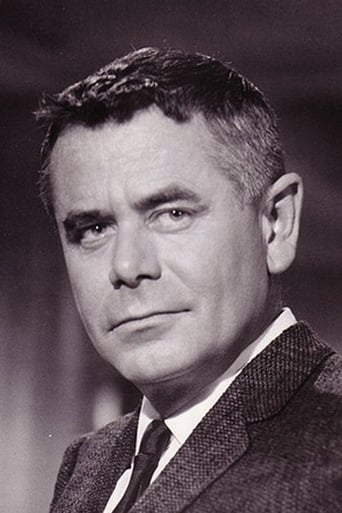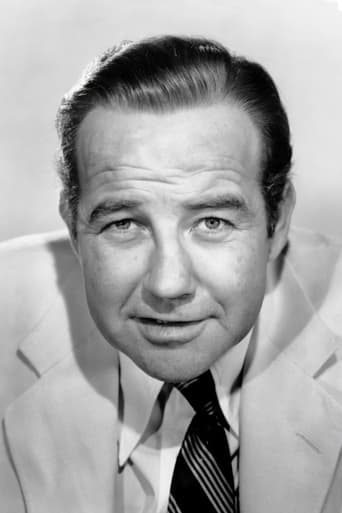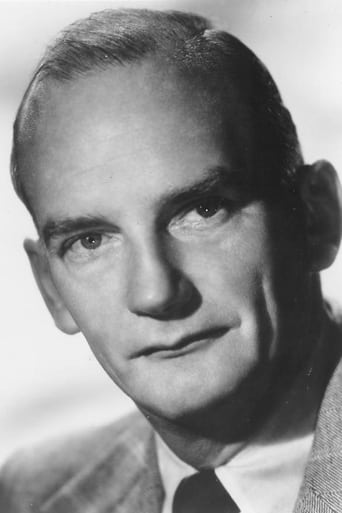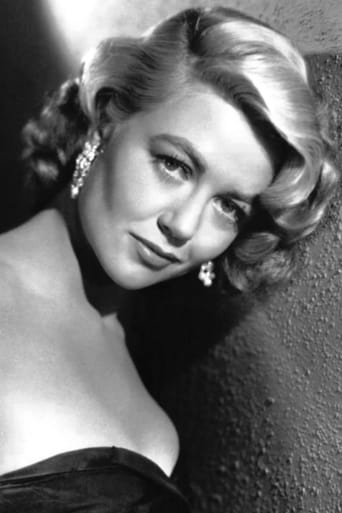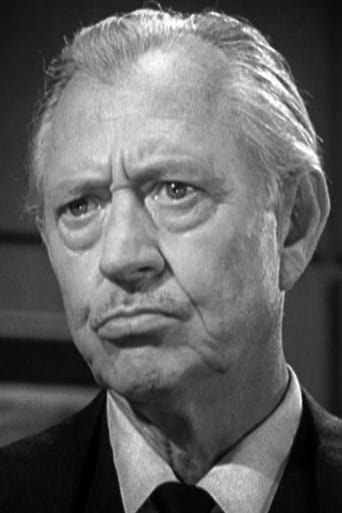Softwing
Most undeservingly overhyped movie of all time??
Skunkyrate
Gripping story with well-crafted characters
Ketrivie
It isn't all that great, actually. Really cheesy and very predicable of how certain scenes are gonna turn play out. However, I guess that's the charm of it all, because I would consider this one of my guilty pleasures.
Philippa
All of these films share one commonality, that being a kind of emotional center that humanizes a cast of monsters.
Robert J. Maxwell
Glenn Ford, a middle-class sort of guy, causes an accidental death and is sent up for one to five because his lawyer bungles the case criminally. Broderick Crawford is the DA who convicted him, but believes Ford got a bum bounce. Crawford becomes the prison warden and brings his daughter, Dorothy Malone, along. She and Ford meet briefly and it's love at first sight. There are more sights when Crawford deliberately makes Ford his chauffeur.Malone leaves for a few weeks and when she comes back she meets Ford again in the warden's office. By an unfortunate juxtaposition of circumstances, Ford has suffered mightily in her absence, and when he leaves the office, Malone says to her Dad, "He doesn't seem like the same man." The problem is that Ford actually DOES seem like the same man -- sullen, taciturn, full of resentment. The first time we SEE him, he's glum and he stays that way throughout, as if he were playing a musical instrument that had only one note on it. He's a decent actor with some considerable range -- from melodrama ("The Big Heat") to comedy ("The Teahouse of the August Moon) -- but not here.Dorothy Malone was never much of an actress. Every word sounds like a memorized line from a script. But she's never looked better than she does here. Really, she's very attractive, though not nearly as sexy as she was allowed to be in "Battle Cry." Broderick Crawford had TWO notes on his instrument -- gruff, factual, sneaky, and happy, gullible, and dumb. Here he's in Role Number One. He's -- how you say? -- stern but fair. But his job as warden leaves him towards the end with his huevos in a vice, just like Ford. Crawford's code is the law. Ford's is not squealing on a friend. The two don't mesh.It's an inexpensive production. There are plenty of extras but few outdoor scenes and no panoramas. We see only a few indoor sets. (It was a play before it was a movie.) It's amazing how much difference location shooting can make. Compare the prison scenes in "Call Northside 777." Prison movies are generally kind of depressing. The entire milieu is so drab. And Harry Levin certainly gives us a sense of the tedium involved in working in the laundry, a place full of clattering machinery and steam.I don't know what prison life was like in 1950, probably more brutal than it is today, which is saying a lot. I doubt Ford would get through Day One without being sodomized by two or three big, bald, tattooed goons with names like T-Bone and Ripper. According to my sources, one of whom claims to be a penologist although he seems to know next to nothing about sex, the film only hints at the atmosphere. Ford is loyal to his friends because they happen to be his cell mates. Modern allegiances extend to a much larger group, often based on race, and survival depends on that membership.In his book, Randall Adams, who spent twelve years in the slams after being unjustly convicted of murder, describes an incident in a Texas prison. He and another inmate are sitting at a table playing cards. Another inmate trips on a steel staircase, perhaps in an epileptic seizure, and tumbles to the bottom. Adams and friend continue playing cards. After a few minutes, one of them saunters to the phone and reports the unconscious body at the foot of the staircase. You have your clique, your clique has enemies, and everyone else is treated with complete indifference.
rightwingisevil
why the district attorney had a soft spot for this specific young man who accidentally hit a man and caused him death? why the district attorney's daughter also had a soft spot for this guy from the very beginning? why this district attorney then became the warden where this young guy was jailed? in nowadays reality, how it possible those arrangements by the new warden could favor to certain prisoners? and how convenient that the district attorney's and then the warden's daughter, an unique beautiful woman would never have a sweetheart or even got married but remained a spinster who only seemed to love the convicted man so subtly albeit so obviously? do you think that a strong-willed district attorney would have encouraged his daughter to befriend a convict felon wholeheartedly from the very beginning? well, unless his daughter was an ugly woman or a crippled woman then this could have been possible, other than that, a normal law enforcer father would never have his beautiful daughter to be near to a convicted fellow. then again, once became a warden, suddenly his home would be in or close to the prison? and he would have the privilege to allow several prisoners to be at his personal service? givemeabreak, will you? this film is just an utopia- like, completely cosmetically beautified picture to show an unrealistic and totally unlikely scenario to suit the purpose of this film. the whole screenplay was like a mirage, if you could believe it, you could believe anything is possible and a carpenter's son could walk on water other than that British street magician, dynamo.
Spikeopath
Joe Hufford is an honest and affable man, but during an altercation in a bar, he punches out a man who sadly dies from banging his head on the floor. All and sundry realise that this is a tragic accident, including the prosecuting DA who tries to feed the inept defence lawyer ammunition in which to keep Hufford out of jail. Found guilty, Joe is sentenced to one to ten years in the pen, working hard and buoyed by the support of his fragile father on the outside, Joe gets about doing his time and hoping for parole, but bad news comes his way and pretty soon Joe's term in jail will turn bitter, can the new warden and his pretty daughter be his salvation?Incarceration based films is a favourite genre of mine, so you can imagine how delighted I am when I happen upon a first time viewing. When the said film turns out to be a positive delight, well I'm in incarceration heaven!. Convicted, directed by Henry Levin, adapted by William Bowers from Martin Flavin's play, and starring Glenn Ford, Broderick Crawford, Millard Mitchell and Dorothy Malone {Ed Begley has a cameo}, is not so much underrated I feel, more like under seen and sadly forgotten.One of the erstwhile reviewers here has suggested that this picture offers nothing new and that we have seen it all before! Really? In 1950? Are you sure? Truth is, that in spite of this being an update of Flavin's own 1931 piece, The Criminal Code, is that yes, this film now looks like standard formula, unlucky prisoner forced to join the convict code of ethics, the yellow snake in the grass, tough guards, the planned break outs, the crusty old lag destined to enact revenge for injustice, but few prison based pictures from the black and white era are as tight and as enjoyable as this one. It boasts a wonderfully reined in performance from Glenn Ford as Hufford, with the first quarter, where Hufford is struck by the incredulity of his situation, is particularly memorable stuff from Ford. Then we also get a special effort from Crawford as DA/Warden Knowland, one scene as he fearlessly walks amongst the cons is a genre highlight to me. But both these men are in the shadow of a quite grizzled and effective turn from Millard Mitchell as Malloby, so much so it quickly became one of my favourite bitter lag performances.It's not without failings, the love interest is misplaced and clearly improbable in practicality {tho it should be noted that Dorothy Malone is fine here as Kay Knowland}, and the finale blows out the basis for "solitary" confinement completely. But really to me these are minor quibbles for a 1950 prison based picture. Steadily directed and acted with skill, it also benefits from the considerable talents of Burnett Guffey in the photography department. All in all it's a fine picture that I highly recommend to genre hound dogs such as myself. You can probably knock off a point for my obvious bias, but I'm definitely giving this one 8/10.
bmacv
A remake of Howard Hawks' 1931 The Criminal Code, Convicted serves up Glenn Ford as an average Joe sent up the river for accidentally causing the death of a man in a night-club brawl. Even the district attorney who prosecuted him (Broderick Crawford) finds his crime pardonable, but a bungled defense sent him to the big house. Parole should come early, but members of the board are cronies of the dead man's father, a prominent citizen, so Ford's in for five years.In stir, Ford grows embittered and embraces the curious codes of the cell block. He tries to eschew the obvious dangers of a Draconian guard (Carl Benton Reid) and the obligatory stoolie (Frank Faylen, most vividly remembered as the sinister male nurse in the alcoholic ward of The Lost Weekend). But prison life is grinding him down and he decides to join in a break out. But he ends up in solitary after assaulting a guard minutes after learning his father has died, so escapes the destiny of his comrades, who are slaughtered.. Next, a change of regime: the new warden is none other than good-hearted Crawford, and with newfound liberties as a trusty he grows sweet on Crawford's daughter (Dorothy Malone). But the skies have not yet cleared, because there's a movement to kill Faylen for causing the deaths of the men involved in the prison break....While not so truculent a prison drama as Brute Force, three years earlier, the more staid Convicted develops with cumulative power. Burnett Guffey photographs the decrepit squalor of the prison with loving revulsion. The script, too, is well written (if lacking the edge of the same year's Caged, set in a women's penitentiary), with a streak of gallows humor shot through it – the warden counts among his household staff a cook who poisoned his wife and a barber who slit a man's throat. The story gets driven by character, as well, and the characters are sharply acted: Millard Mitchell, as Ford's cellmate, and Faylen are especially memorable.Ford, on the other hand, plays the masochist a little too readily, a point that would not be so finely drawn if it didn't parallel so many of his other roles in the noir cycle. As a result, that quintessential bull-in-a-china shop, Crawford, upstages him scene after scene. Despite a wrap-up that's a bit too sunny to swallow, Convicted holds an honorable place in the long line of movies that have peered into the national psychosis we like to refer to as rehabilitation.
